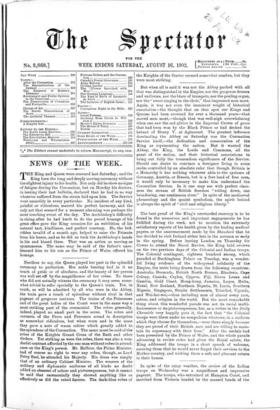The best proof of the King's unretarded recovery is to
be found in the numerous and important engagements he has fulfilled during the week, not to mention the extremely satisfactory reports of his health given by the leading medical papers, or the announcement made by the Standard that he has decided to visit Ireland either late in the autumn or early in the spring. Before leaving London on Thursday for Cowes to attend the Naval Review, the King held reviews on the two previous days of the Colonial and Indian troops. The Colonial contingent, eighteen hundred strong, which paraded at Buckingham Palace on Tuesday, was a wonder- ful living evidence of the widespread solidarity of the Empire, the units being drawn from the following countries Australia, Bermuda, British North Borneo, Rhodesia, ()ape Colony, Canada, Ceylon, Cyprus, Fiji, Sierra Leone and Gambia, Gold Coast, Hong-kong, Jamaica, Lagos, Malta, Natal, New Zealand, Northern Nigeria, St. Lucia, Southern Nigeria, Singapore, Straits Settlements, Trinidad, Uganda, and Wei-hai-wei,—thus including men of almost every race, colour, and religion in the world. But the most remarkable thing about this wonderful parade was not its racial multi- fariousness or its picturesqueness, but, as a writer in the Daily Chronicle very happily puts it, the fact that " the Colonial troops were there under no compulsion whatever, in a uniform which they choose for themselves,—were there simply because they are proud of their British race and are willing to main- tain its supremacy with their lives." After the medals had been presented by the Prince of Wales, and the whole parade advancing in review order had given the Royal salute, the King addressed the troops in a short speech of welcome, assuring them that he would never forget their services to the Mother-country, and wishing them a safe and pleasant return to their homes.


































